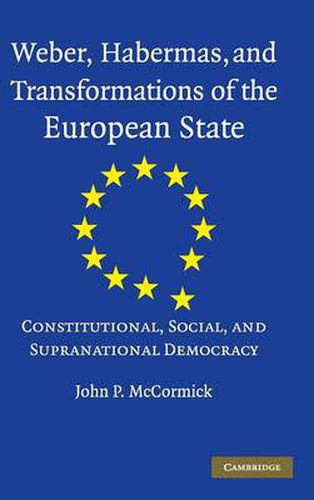Readings Newsletter
Become a Readings Member to make your shopping experience even easier.
Sign in or sign up for free!
You’re not far away from qualifying for FREE standard shipping within Australia
You’ve qualified for FREE standard shipping within Australia
The cart is loading…






This book critically engages Jurgen Habermas’s comprehensive vision of constitutional democracy in the European Union. John P. McCormick draws on the writings of Max Weber (and Habermas’s own critique of them) to confront the difficulty of theorizing progressive politics during moments of radical state transformation. Both theorists employ normative and empirical categories, drawn from earlier historical epochs, to analyze contemporary structural transformations: Weber evaluated the emergence of the Sozialstaat with antedated categories derived from nineteenth-century and premodern historical examples; while Habermas understands the EU almost exclusively in terms of the liberal (Rechtsstaat) and welfare state (Sozialstaat) paradigms. Largely forsaking the focus on structural transformation that characterized his early work, Habermas conceptualizes the EU as a territorially expanded nation-state. McCormick demonstrates the deficiencies of such an approach and outlines a more appropriate normative-empirical model, the supranational Sektoralstaat, for evaluating prospects for constitutional and social democracy in the EU.
$9.00 standard shipping within Australia
FREE standard shipping within Australia for orders over $100.00
Express & International shipping calculated at checkout
This book critically engages Jurgen Habermas’s comprehensive vision of constitutional democracy in the European Union. John P. McCormick draws on the writings of Max Weber (and Habermas’s own critique of them) to confront the difficulty of theorizing progressive politics during moments of radical state transformation. Both theorists employ normative and empirical categories, drawn from earlier historical epochs, to analyze contemporary structural transformations: Weber evaluated the emergence of the Sozialstaat with antedated categories derived from nineteenth-century and premodern historical examples; while Habermas understands the EU almost exclusively in terms of the liberal (Rechtsstaat) and welfare state (Sozialstaat) paradigms. Largely forsaking the focus on structural transformation that characterized his early work, Habermas conceptualizes the EU as a territorially expanded nation-state. McCormick demonstrates the deficiencies of such an approach and outlines a more appropriate normative-empirical model, the supranational Sektoralstaat, for evaluating prospects for constitutional and social democracy in the EU.